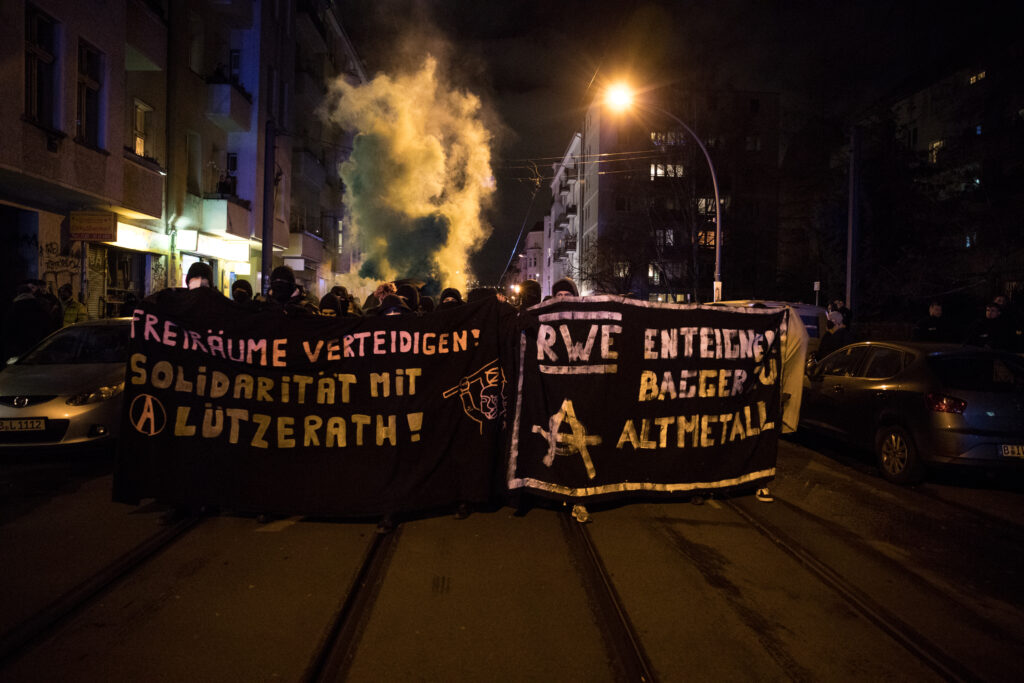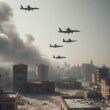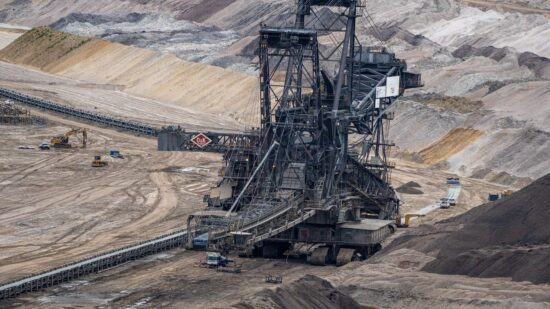Climate activist Greta Thunberg visits Lützerath, joins protest against coal mining, and criticizes police eviction. Press freedom is restricted by both RWE security and police actions, according to journalists union.
On Friday, Greta Thunberg, a Swedish climate activist, visited the town of Lützerath and the Garzweiler open-pit coal mine. Thunberg held a sign that read “Keep it in the ground” and called the police’s eviction of the town “shocking.” She also announced that she would participate in a planned large demonstration on Saturday to preserve the town. The police are currently focusing on clearing underground tunnels where two activists are said to be. The activists have stated that they will chain themselves to prevent removal. The tunnels are several meters deep, and the stability and air supply are unknown. The eviction of the protesters from the tunnels is ongoing.
Press Union Representative Jörg Reichel Condemns RWE Security and Police for Attacks on Journalists and Hindrance of Press Freedom During Eviction of Lützerath
Press Union representative Jörg Reichel criticizes the actions of RWE security and the police against journalists during the eviction of Lützerath. Reichel reports that there have been physical attacks on journalists and hindrances to press work, including police demands for the deletion of photographs. He attributes the actions of RWE security to uneducated employees who resort to physical force to handle conflicts and calls for RWE security to meet formal requirements to operate in conjunction with the police. He also criticizes the police for not responding to requests for the protection of press freedom and for acting in the interests of RWE rather than the public.
Journalists Union Condemns Restrictions on Press Freedom during Lützerath Eviction by RWE and Police
The Journalists Union (dju) has criticized the restrictions on press freedom that both RWE and the police imposed during the eviction of the town of Lützerath. The union’s representative, Jörg Reichel, reported that journalists were being blocked at police checkpoints, and in one case, a photographer was even ordered by the police to delete photographs. According to Reichel, the photographer complied with the request. Reichel based his statements on the accounts of multiple eyewitnesses. However, a spokesman for the Aachen police stated that they were unaware of the incident regarding the deletion of photographs and that such actions would be contradictory to their protocol for dealing with the media.
Furthermore, the police have yet to explain why journalists have been denied access to the area. The eviction of Lützerath is taking place so that RWE, a German energy company, can extract the underlying brown coal. The situation in Lützerath is highly political and has gained international attention due to the presence of climate activist Greta Thunberg. Journalists play a crucial role in informing the public about the actions of both the police and RWE in this highly-charged situation, and any restrictions on press freedom are cause for concern.

Freedom of the Press Under Attack: The Importance of a Free Press in Germany and the Case of the Eviction of Lützerath
Freedom of the press is a fundamental right in any democratic society, and Germany is no exception. It is the cornerstone of a free and open community, allowing citizens to access information and hold their government accountable. However, in the case of the eviction of Lützerath, the actions of RWE security and the police against journalists violate this right and must be condemned.
In a democratic society, the press is vital in informing citizens and holding those in power accountable. It acts as a watchdog, ensuring that the government and corporations are working in the people’s best interests. With a free press, citizens could understand important issues and decisions that affect their lives. This is particularly important in situations like the eviction of Lützerath, where there is a clear public interest in understanding the actions of RWE and the police.
The press also plays a crucial role in promoting transparency and accountability. Journalists can investigate and report on matters of public concern, providing citizens with the information they need to make informed decisions. This is especially important in situations where there is a lack of transparency, as is the case with the eviction of Lützerath. The actions of RWE security and the police in attacking journalists and hindering press work are an apparent attempt to conceal their activities from the public.
Furthermore, freedom of the press is not only a right in itself but also a safeguard for other rights and freedoms. A free press is essential to protect other human rights, such as freedom of expression and assembly. In situations like the eviction of Lützerath, where peaceful protestors were met with violence, the press plays a critical role in documenting and reporting human rights abuses. Without a free press, there would be no way to hold those responsible accountable.
In the case of Lützerath, Press Union representative Jörg Reichel has criticized the actions of RWE security and the police against journalists. He reports that there have been physical attacks on journalists and hindrances to press work, including police demands for the deletion of photographs. He attributes the actions of RWE security to uneducated employees who resort to physical force to handle conflicts and calls for RWE security to meet formal requirements to operate in conjunction with the police. He also criticizes the police for not responding to requests for the protection of press freedom and for acting in the interests of RWE rather than the public.
These actions violate the freedom of the press and must be condemned. The press has a right to report on matters of public concern without fear of violence or intimidation. RWE security and the police are responsible for respecting this right and protecting journalists as they carry out their work.
In conclusion, freedom of the press is a fundamental right in any democratic society and is essential for protecting other rights and freedoms. The actions of RWE security and the police in attacking journalists and hindering press work during the eviction of Lützerath are a clear violation of this right and must be condemned. The government, RWE, and the police must take steps to ensure that journalists can carry out their work without fear of violence or intimidation. Furthermore, the public has a right to know what is happening in their society, and the press plays a critical role in informing them.





